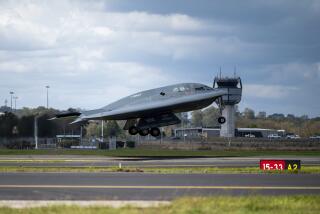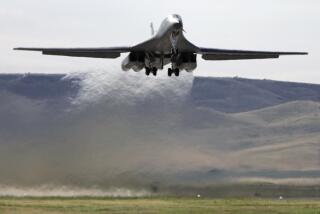Wait for B-2 Tests, Congress Urged : Defense: Investigators favor a slowdown until the bomber is shown to perform as advertised. The aircraft’s backers say delays will boost costs.
- Share via
WASHINGTON — In a blow to supporters of the B-2 Stealth bomber, the General Accounting Office said Thursday that it would be “prudent” to reduce funding and production until tests show whether the plane can perform as advertised.
“Under the current acquisition plan, 31 aircraft will be on order and over $48 billion will have been appropriated before anyone knows whether the B-2 will do its job,” a top official of Congress’ investigative agency told the House Armed Services Committee.
Frank C. Conahan, who heads the GAO’s defense section, suggested that the agency favors suspending or drastically cutting production for three years while tests are conducted on the B-2’s ability to evade radar and perform complex electronic tasks.
However, he acknowledged that the GAO lacks data on how much delays would cost and whether it would be worth the risk, instead, to continue with production and correct any errors with retrofits.
Thus, in presenting a 26-page report on problems in the program, Conahan urged that the Pentagon provide cost estimates on alternatives to the full-paced production requested by President Bush for the fiscal year beginning Oct. 1.
Bush has asked for $5.3 billion in fiscal 1991 to build five planes beyond the 16 already in the pipeline, only one of which has actually flown. The Air Force has proposed building a total of 133, at a projected cost that has grown in four years from $58.2 billion to $70.2 billion.
Critics of the B-2 program immediately seized on the GAO report as ammunition in what is expected to be one of the most fiercely fought battles over defense spending this year.
B-2 proponents sharply attacked the report, protesting that it failed to estimate costs of dramatically slowing production.
Rep. Norm Dicks (D-Wash.) claimed that the Air Force and Northrop Corp., the prime contractor, figure that a one-year shutdown would cost $4.2 billion.
And Rep. William L. (Bill) Dickinson (R-Ala.) expressed the fear that idling production lines would drive up costs and doom the program.
Stretching out production, he said, could escalate per-unit costs from the current estimate of $530 million to as much as $1 billion, making the B-2 an easy target for budget-cutters.
“As the target gets bigger, people say, ‘Hell, we don’t need that, let’s take that money and keep that base open in my district or build the V-22” Osprey tilt-rotor aircraft, another controversial program, Dickinson said.
And delays could severely disrupt production lines in California and elsewhere, he added. The bulk of the work for the B-2 is done in Northrop plants in Pico Rivera and Palmdale.
“We’ve got several thousand people who have gone through (security) clearances to get a job,” he said. “We can’t keep these people in limbo and put them through retraining and recertification. I think that would be the surest way of killing the program, if we put it on a one- or two-year hold (while we) finish answering all the questions.”
The House odd couple that is spearheading opposition to the B-2--liberal Rep. Ronald V. Dellums (D-Berkeley) and conservative Rep. John R. Kasich (R-Ohio)--praised the GAO findings but suggested the agency should have recommended canceling the program outright.
“Frankly, I’m disappointed that you did not draw the only logical conclusion you could draw,” Kasich said.
Dellums said that even if the cost and test results were “reasonable,” the new plane has “very dubious value” as a strategic weapon intended to penetrate Soviet air defenses.
In a statement responding to the GAO report, the Air Force called the B-2 “both affordable and essential” and said that flight tests to date have been successful. It noted that on-board testing of sophisticated electronics equipment will begin on schedule in fiscal 1991.
“Any slippage of the production schedule will only create program instability and increase costs,” the statement said.
Northrop spokesman Loye Miller, asked for comment on the GAO report, said only that the Air Force response was about “as succinct a positive statement that they’ve given on the B-2 in quite a while.”
Dickinson chided Conahan for not including in his report “good news” about the B-2’s successful tests.
Conahan said that only 31 hours of a 3,600-hour test program had been completed, focusing on airworthiness. The B-1 bomber also was successful in early tests, he noted, but ran into severe difficulty later with electronic systems that required expensive retrofits.
He said that production should be slowed in other costly programs, such as the SSN 21 submarine, until testing is completed.
More to Read
Inside the business of entertainment
The Wide Shot brings you news, analysis and insights on everything from streaming wars to production — and what it all means for the future.
You may occasionally receive promotional content from the Los Angeles Times.










